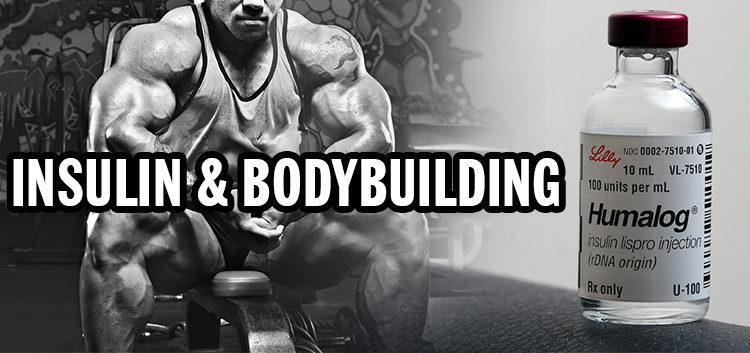
Insulin in bodybuilding
Why is insulin needed and how does it work?
Insulin is a peptide hormone, formed in the beta cells of the islets of Langerhans of the pancreas. It has a multifaceted effect on metabolism in almost all tissues. The main action of insulin is to lower the concentration of glucose in the blood. In bodybuilding, insulin is used due to its pronounced anabolic effect.
Insulin increases the permeability of plasma membranes for glucose, activates key glycolysis enzymes, stimulates the formation of glycogen from glucose in the liver and muscles, and enhances the synthesis of fats and proteins. In addition, insulin inhibits the activity of enzymes that break down glycogen and fats. That is, in addition to the anabolic effect, insulin also has an anti-catabolic effect.
The transport of glucose in two types of tissues depends to the greatest extent on insulin: muscle tissue and adipose tissue – this is the so-called. insulin-dependent tissues.
Insulin effects
- increased absorption of glucose and other substances by cells;
- activation of key glycolysis enzymes;
- an increase in the intensity of glycogen synthesis – insulin accelerates the storage of glucose by liver and muscle cells by polymerizing it into glycogen;
- a decrease in the intensity of gluconeogenesis – the formation of glucose in the liver from various substances of a non-carbohydrate nature (proteins and fats) decreases.
Anabolic action of insulin
- enhances the absorption of amino acids by cells (especially leucine and valine);
- enhances the transport of potassium ions into the cell, as well as magnesium and phosphate;
- enhances DNA replication and protein biosynthesis;
- enhances the synthesis of fatty acids and their subsequent esterification – in adipose tissue and in the liver, insulin promotes the conversion of glucose into triglycerides; with a lack of insulin, the opposite occurs – the mobilization of fats.
Insulin anti-catabolic action
- inhibits protein hydrolysis – reduces protein degradation;
- reduces lipolysis – reduces the flow of fatty acids into the blood.
The Dangers of Using Insulin
Perhaps the main factor in insulin’s bad reputation is the risk of hypoglycemia. On any forum, you can find messages of a warning nature, as if even a slight excess of the dose of insulin could be fatal. However, scientific and practical evidence suggests otherwise: the lowest lethal dose of insulin is 100 U, that is, a full insulin syringe. Many people survive even after 3000 IU doses! But in the event of a serious insulin overdose, there is no time to call an ambulance in a clear consciousness. Depending on the degree of overdose, it takes from several minutes to several hours to the development of a coma, so even lethal doses of insulin do not cause death if the timely flow of glucose into the blood begins.
What insulin is used in bodybuilding
In bodybuilding, short-acting and ultra-short-acting insulin should be used:
Short-acting insulin
Short insulin begins to act when injected subcutaneously after 30 minutes (therefore, it is administered 30-40 minutes before meals), the peak of action occurs after 2 hours, disappears from the body after 5-6 hours.
The best choice:
- Humulin Regular
- Actrapid HM
Ultra-short-acting insulin
Ultra-short insulin begins to act in 0-15 minutes, peak in 2 hours, disappear from the body in 3-4 hours. It is more physiological and can be administered immediately before a meal (5-10 minutes) or immediately after a meal.
The best choice:
- Insulin aspart (NovoRapid Penfill, NovoRapid FlexPen).
- Insulin lispro (Humalog)
- Insulin glulisine (Apidra) are all semi-synthetic analogs of human insulin.
Advantages and Disadvantages of Insulin
Benefits:
- Low cost of the cycle
- Availability – the drug can be purchased freely at the pharmacy
- High quality – counterfeits are practically excluded, unlike steroids
- Lack of toxicity, low frequency of side effects, almost complete absence of the consequences of the course
- Pronounced anabolic effect
- Can be combined with anabolic steroids and other drugs
- Lack of androgenic effects
- Insulin DOES NOT have a toxic effect on the liver or kidneys, and also DOES NOT CAUSE sexual dysfunction.
Disadvantages:
- Complex reception scheme
- Significant fat gain
- Hypoglycemia
Sivuvaikutukset
Hypoglycemia or a decrease in the concentration of glucose in the blood, which entails all other manifestations. Hypoglycemia can be easily prevented, read about it in the main article – Hypoglycemia.
Itching in the area of the injection
Allergy – extremely rare
Decreased endogenous insulin secretion – occurs only with very long courses with high doses of insulin
A decrease in endogenous insulin secretion occurs only during exogenous use of insulin (duration of action of short-acting or ultra-short-acting insulin). Insulin, unlike other endocrine hormones, is not regulated by the hypothalamic-pituitary system and does not have a feedback principle. The only stimulators of insulin synthesis are the level of glycemia and food intake (through the mechanism of the secretin cascade). Therefore, even a very long-term use of insulin does not change its secretion, after its withdrawal. But this is not a positive quality of the use of this hormone, since the risk of developing hypoglycemic conditions is very high !! To stop hypoglycemia, it is necessary to use fast carbohydrates, and since short or ultrashort insulin is used, all fast carbohydrates entering the bloodstream are carried away in the process of lipogenesis in adipose tissue. Excessive use of insulin, its “overdose” leads to an increase in fat reserves. As an anabolic hormone, it is weak, but hypoglycemia leads to the release of growth hormone, which has an anabolic effect.
